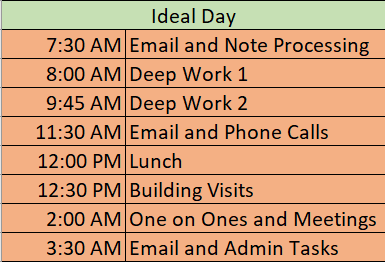Ideal Week for a Special Education Director
Every year the start of the school year gives me a reason to pause and rethink how I approach my work. While I know that reality will always drift from my intentions, I also know the act of being strategic is impactful in its own way. In the words of Eisenhower, “Plans are worthless, but planning is everything.”
This year, I am approaching the school year with the concept of the Ideal Week and the Ideal Day. This is a concept I first heard shared by Jethro Jones in his Transformative Principal podcast, and most recently explored through the Focused podcast with David Sparks and Mike Schmitz.
The idea of the Ideal Week and Ideal Day is that you think strategically about the type of work you need to get done, when you are best at the different types of work, and other factors. Below I’m going to outline what I’ve considered for my Ideal Week and Ideal Day.
Ideal Week
My Ideal Week has dedicated time for my key areas of responsibilities, key projects, cooperative priorities, time in classrooms, and dedicated time for administrative tasks such as email, approvals, and personnel matters.
My key areas of responsibility include general cooperative operations, financial management, and liaisoning with partner agencies. As an executive of an organization, you must remember that while you can do some of the day-to-day work, your real purpose is to think, decide, and communicate. Anything that takes away from that is time that should be considered to be delegated to others or to the floor. My priority areas for the cooperative also need focused time, and those include Core Access for All (work to increase the inclusion of students with disabilities in the grade level core instruction) and Para CareerPath (work to return paraeducator positions to the place as a career option for those who are committed to that work).
Each week I have scheduled time to make sure the key areas mentioned above get attention and are able to move forward. But where do these things fit best? That is where the Ideal Day comes into play.
Ideal Day
The Ideal Day recognizes that we have different energy levels and different focus levels at different points in the day. This differs for everyone, but generally, we all are inconsistent over the course of each day. If you have higher energy in the morning, that time is wasted if it is used on lower energy tasks such as purchase approvals. To maximize our impact each day, we need to consider our own day and try to control things as best we can. Truly, there are things that come up outside of your control that will not fit into your Ideal Day, and that is okay. This is about improvement, not perfection. Don’t be so rigid about this that it causes a hit to your relationships with others or affects your effectiveness in important areas of responsibility.
For me, I have greater capacity for deeper thinking in the morning hours, I have lower energy in the afternoon. I find that most people follow this pattern, but not everyone.
Because of this, I have set up my Ideal Day as Follows
Deep Work sessions are where I have dedicated time to work on my key responsibilities. I put these in the morning because if they do not happen then, they are less likely to happen. And they must happen if I expect to keep moving those areas forward.
My email sessions are part of other work I’ve done to minimize my time in email, which could consume the entire day if I allowed it.
Building visits are in the afternoon because when I’m in buildings and classrooms, I tend to get a boost in energy. They are scheduled intentionally because the Deep Work sessions lead to better decisions when I have more experiences that involve our staff and students.
Everything else fits in the places where they will still meet their purpose. Meetings and one on ones are great for the late afternoon because they are largely information gathering. Any decision-making is usually group decision-making, which takes less individual energy. Admin tasks go at the end of the day when my brain has turned to mush and anything more demanding will be negatively impacted. It doesn’t mean important work doesn’t happen in that time, but if I have something scheduled in the afternoon that takes greater focus, I know I need to be more mindful early in the day about what I’m doing.
Making it Work
Anytime you come up with a strategy to improve, you have to think about accountability for your plan. For me, in my Outlook Calendar, I’ve created a calendar called Ideal Week, and scheduled out each day as I described above. This year, I will use my Weekly Review period at the end of Friday to compare the Ideal Week with what I really did and plan for the next week to be closer to the ideal. There are already conflicts that will interfere with this, and I just have to do my best, but having a strategy that may need to be adjusted is better than having no strategy at all.
So what do you think about the Ideal Week or the Ideal Day? What is your Ideal Day? Share below.



